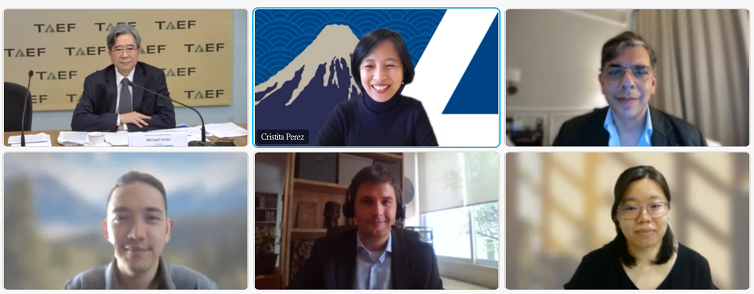On November 7, 2022, Taiwan Asia Exchange Foundation (TAEF) and the Konrad Adenauer Stiftung’s (KAS) Regional Economic Programme Asia (SOPAS) organized a conference “A Better (Re)Start: The Future of Work for Young People.” Given the disruption to the global economy, education systems and labor markets due to globalization and the COVID-19 pandemic, we discussed the trends and patterns within the youth education and labor environment in Asia. The event was opened by Rabea Brauer, KAS Country Representative and SOPAS Director of KAS, and Dr. Hsin-Huang Michael Hsiao, Chairman of TAEF, followed by a keynote address by Chiao Ting Huang, Senior Executive Officer of Taiwan’s Ministry of Labor. The forum was divided into two panels: 1) What is at Stake? Systemic Changes and Post-Pandemic Labor Market Trends, moderated by Dr. Hsiao; 2) Policies that Work: Future-Proofing Education Policies and Career Opportunities, moderated by Dr. Alan H. Yang, Executive Director of TAEF.
The keynote address was by Chiao-Ting Huang, the Senior Executive Officer of the Ministry of Labor in Taiwan. Ms. Huang evaluated the current state of youth employment in Taiwan and described several programs implemented by the Ministry of Labor to boost youth participation in the workforce. Youth offer valuable potential; Ms. Huang called on governments to capitalize on this by promoting youth opportunities and entry into the job market.
Panel 1 was moderated by Dr. Hsiao. Panelists analyzed trends in the labor market and predicted systemic changes. Here are some of the highlights:
- Dr. Jayant Menon, Senior Fellow at the ISEAS - Yusof Ishak Institute argued that the COVID-19 pandemic has accelerated the world system’s transition to a digital economy. He argues that this transition will impact the viability of our current workforce and that systemic changes in our labor market and education system are needed to adapt.
- Dr. Upalat Korwatanasakul, Associate Professor at the School of Social Sciences at Waseda University, discussed how Technical and Vocational Education and Training (TVET) programs faced disruption during the COVID-19 pandemic that exacerbated the disparity for disadvantaged groups. He argued that youths were particularly affected and that TVET programs can help with skill preparedness.
- Dr. Christian Viegelahn, Labor Economist of the Regional Economic and Social Analysis Unit of the International Labor Organization, argued that youth were the group in the labor market most affected by the COVID-19 pandemic, with potential consequences for their future economic outcomes. Dr. Viegelahn called for governments to reate coherent strategies to combat youth unemployment.
Panel 2 was moderated by Dr. Yang, who focused on the three goals of increasing employability, guaranteeing decent incomes, and improving job satisfaction. In essence,
- Dr. Chey-Nan Hsieh, Professor at the Department of Labor and Human Resources at Chinese Culture University, predicted that the development of new technologies will affect employment structures. He called on the state, markets, and civil society to develop new regimes in response to these coming shocks.
- Gabi Yen, Project Manager at the Talent Circulation Alliance Program (TCA), introduced the importance and potential of talent circulation, embodied by TCA’s internship programs. The programs provide participants with digital skills, experience, networking, and adaption, highly transferable skills for industries like Big Data and AI.
- Dr. M. Niaz Asadullah, Professor of Economics at Monash University Malaysia and the Southeast Asia Lead at the Global Labor Organization, highlighted how the future global labor market faces disruption, displacement, and digitalization, and foundational skills are changing in response but global skills deficit remains a challenge. Improvements in formal schooling are necessary to build the soft and hard skills that will be most employable in the future.
- Finally, Chi-Fu Lin, Chief Executive of Starboard, emphasized the importance of global talent in the labor market for the Taiwanese economy. Mr. Lin called on the government to take a more active role in assisting companies to access international markets, especially small and medium-sized enterprises.
Participants offered diverse insights into the changing economy and its implications for the youth now entering and navigating the labor market. Ultimately these experts agreed on the need for governments, businesses, and civil society to prepare for the disruption to our current workforce that is likely from these systemic changes.
You can now
